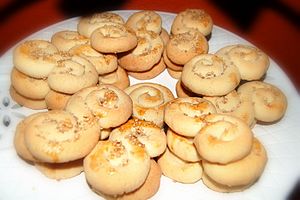Koulourakia facts for kids

Koulourakia
|
|
| Alternative names | Easter biscuits |
|---|---|
| Type | Pastry |
| Course | Dessert |
| Place of origin | Greece |
| Region or state | Greece |
| Serving temperature | Hot or cold |
| Main ingredients | Butter |
Koulourakia (pronounced Koo-loo-RAH-kya) are a special type of Greek cookie or biscuit. They are often called Easter biscuits because they are traditionally made in Greece around Easter time. People usually enjoy them after Holy Saturday.
These delicious cookies are made mostly with butter. They are often shaped by hand and have a shiny egg glaze on top. Koulourakia have a sweet, delicate flavor, often with a hint of vanilla. You can easily recognize them by their sprinkle of sesame seeds and their unique, often ring-like shapes. The word "Koulourakia" actually means a small ring-shaped bread or a lifebelt!
Koulourakia can be shaped in many fun ways. Some common shapes include braided circles, hairpin twists, figure eights, twisted wreaths, or even horseshoes. Sometimes, they are shaped like Greek letters or even snakes. A small clove is often placed in the middle of the cookie for extra flavor. People commonly eat Koulourakia with their morning coffee or afternoon tea. To keep them fresh, these cookies are usually stored in a dry place, like a jar with a lid.
History of Koulourakia
Koulourakia have a very long history! People have been making these cookies since at least the time of the Minoan civilization. The Minoans were an ancient civilization that lived on the island of Crete, part of modern-day Greece. Sometimes, the Minoans would shape their pastries like small snakes. They did this because they believed snakes had special healing powers and they honored them.
See also
 In Spanish: Koulourakia para niños
In Spanish: Koulourakia para niños
 | Shirley Ann Jackson |
 | Garett Morgan |
 | J. Ernest Wilkins Jr. |
 | Elijah McCoy |

